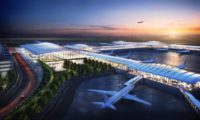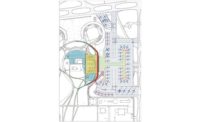A Kansas City-based engineering firm is proposing to finance, design and build a new $2.5-billion single terminal for the Missouri city’s airport, a project long sought by airport officials. But Burns & McDonnell now faces competitive bids, thanks to a city council vote that eliminated its right of first refusal.
Burns & McDonnell last month presented a memorandum of understanding to Kansas City officials, stating that it will put its own money into the project, attract other investors and line up private lenders. The firm also promised to use local subcontractors and partner with a local general contractor for construction.
Burns & McDonnell would design a roughly 750,000-sq-ft terminal, with at least 35 gates and 6,500 parking spaces. KCI’s existing Terminal A and its garage and Terminal B would be demolished.
The MOU states that the airlines, federal grants and other potential funding sources would cover approximately $85.2 million a year for 30 years. Burns & McDonnell also would benefit from sales-tax exemptions on construction materials and equipment costs and a waiver of any project property-tax liability. Further, if necessary, it would allow the developer entity to reap the proceeds of a 1¢ sales-tax surcharge on retail sales at KCI.
Supporters, such as Kansas City Mayor Sly James (I), had wanted the city council to adhere to an RFP process for competitive bids that would have ended on June 20; instead, the council extended that RFP process to Aug. 1 and eliminated a right of first refusal for Burns & McDonnell, disallowing the firm’s request to match or exceed competing proposals.
AECOM has told the city it is interested in submitting a proposal. Local reports state that AECOM also wants to maintain and operate the new facility, something the council has said would be a non-starter.
“Frankly, the timeframe now is more in line with what you normally see for a project this size,” said Roger Dick, a spokesman for Burns & McDonnell. “However, the longer this process takes, the more it puts into question the financial support of the airlines.”
A major public-works project like this would still require approval in a referendum by city voters, something that Burns & McDonnell hopes to see in November.
Southwest Airlines wants a public decision this year, wrote Steve Sisneros, director of airport affairs for Southwest, in an email to Pat Klein, the airport’s aviation director. Southwest and Delta Airlines are the two largest carriers at Kansas City International. “The airlines want the election to occur as soon as possible, and we hoped it would have occurred by now,” Sisneros wrote. He said that if a public referendum on airport modernization is postponed until 2018, the cost of a new terminal, judged to be about $964 million in 2015 dollars, “would be nearly three years old and would have to be updated.”
When KCI was completed in 1972, it was billed as a model of airport efficiency, with “curb-to-flight” appeal. In the pre-9/11 days, it boasted the ability to park your car, walk to your specific gate and fly out without cumbersome, long hallways and connecting infrastructure.
In the decades since, both security requirements and changes in aviation practices have taken much of the convenience out of flying into or out of KCI. The Transportation Security Administration has expressed concerns to both airport officials and city government about improving security practices.
KCI officials have long noted that a new terminal would be more cost-effective and beneficial than trying to renovate existing infrastructure.
Still, KCI has users who enjoy its drive-up convenience and remain suspicious of a single terminal. Another single-terminal plan was pulled by James last year, after it failed to poll above 38% with voters. However, a recent Remington Research poll of 1,000 voters showed that, when asked specifically about the Burns & McDonnell plan, 55% of those polled favored the proposal, compared to 23% who were against it and 22% who were unsure.





Post a comment to this article
Report Abusive Comment